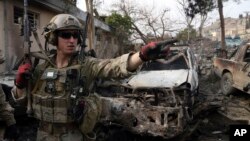THE WHITE HOUSE —
President Obama called Afghan President Karzai on Tuesday to reiterate that there will be no U.S. troop presence on the ground in Afghanistan unless the Afghan government signs a bilateral security agreement.
Before they spoke on the phone Tuesday, Obama and Karzai were not known to have spoken for months.
The Afghan leader has refused to sign the Bilateral Security Agreement that the United States and NATO insist is necessary to plan for a post-2014 troop presence to support counter-terrorism and training of Afghan forces.
White House Press Secretary Jay Carney expressed growing concerns on Tuesday.
"The longer we go without a BSA, and we have been making this clear, the more challenging it will be to plan and to execute any U.S. mission," said Carney, adding "Furthermore, the longer we go without a signed BSA, the more likely it will be that any post-2014 mission will be smaller in scale and ambition."
Asked later whether he could state that without signing of the agreement there will be no troops on the ground in Afghanistan beyond December 31, Carney said "absolutely."
Obama has directed the Pentagon to proceed with contingency planning to ensure, as a Defense Department statement said, that plans are in place to accomplish an orderly withdrawal by the end of the year.
Defense Secretary Chuck Hagel called this a prudent step, given that Karzai has demonstrated it is unlikely he will sign the security accord, which would provide U.S. military personnel with what officials call "critical protections and authorities after 2014."
Hagel said the U.S. military will be moving people and equipment out of the Afghan war theater, but its force posture will provide "various options for U.S. and NATO political leaders."
Planning will continue, he added, for U.S. participation in a NATO-led mission focused on training, advising and assisting Afghan security forces, and a narrowly focused counterterrorism mission.
Hagel attends a meeting in Brussels this week of NATO and defense ministers of the International Security Force in Afghanistan.
In his call with Karzai, Obama made clear, according to Carney, that the U.S. is open to the signing of a security agreement later in the year.
Carney also was asked if the White House has reason to believe that any of the presidential candidates in Afghanistan would sign the accord.
" I don't think we would, given the experience we've had, predict with any great certainty what might happen. I would note that those who cover these issues have reported that candidates have suggested they support it. But we will obviously wait to see what happens," he said.
Carney emphasized again that the U.S.-NATO policy goal has always depended on signing the accord, and the longer it takes the more likely a "zero option" becomes and the smaller any mission would be beyond 2014.
Before they spoke on the phone Tuesday, Obama and Karzai were not known to have spoken for months.
The Afghan leader has refused to sign the Bilateral Security Agreement that the United States and NATO insist is necessary to plan for a post-2014 troop presence to support counter-terrorism and training of Afghan forces.
White House Press Secretary Jay Carney expressed growing concerns on Tuesday.
"The longer we go without a BSA, and we have been making this clear, the more challenging it will be to plan and to execute any U.S. mission," said Carney, adding "Furthermore, the longer we go without a signed BSA, the more likely it will be that any post-2014 mission will be smaller in scale and ambition."
Asked later whether he could state that without signing of the agreement there will be no troops on the ground in Afghanistan beyond December 31, Carney said "absolutely."
Obama has directed the Pentagon to proceed with contingency planning to ensure, as a Defense Department statement said, that plans are in place to accomplish an orderly withdrawal by the end of the year.
Defense Secretary Chuck Hagel called this a prudent step, given that Karzai has demonstrated it is unlikely he will sign the security accord, which would provide U.S. military personnel with what officials call "critical protections and authorities after 2014."
Hagel said the U.S. military will be moving people and equipment out of the Afghan war theater, but its force posture will provide "various options for U.S. and NATO political leaders."
Planning will continue, he added, for U.S. participation in a NATO-led mission focused on training, advising and assisting Afghan security forces, and a narrowly focused counterterrorism mission.
Hagel attends a meeting in Brussels this week of NATO and defense ministers of the International Security Force in Afghanistan.
In his call with Karzai, Obama made clear, according to Carney, that the U.S. is open to the signing of a security agreement later in the year.
Carney also was asked if the White House has reason to believe that any of the presidential candidates in Afghanistan would sign the accord.
" I don't think we would, given the experience we've had, predict with any great certainty what might happen. I would note that those who cover these issues have reported that candidates have suggested they support it. But we will obviously wait to see what happens," he said.
Carney emphasized again that the U.S.-NATO policy goal has always depended on signing the accord, and the longer it takes the more likely a "zero option" becomes and the smaller any mission would be beyond 2014.






